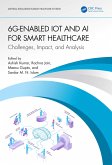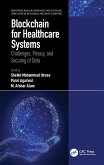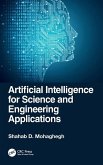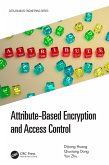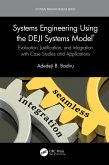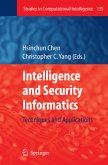Artificial Intelligence Using Federated Learning
Fundamentals, Challenges, and Applications
Herausgeber: Elngar, Ahmed A; Balas, Valentina E; Oliva, Diego
Artificial Intelligence Using Federated Learning
Fundamentals, Challenges, and Applications
Herausgeber: Elngar, Ahmed A; Balas, Valentina E; Oliva, Diego
- Gebundenes Buch
- Merkliste
- Auf die Merkliste
- Bewerten Bewerten
- Teilen
- Produkt teilen
- Produkterinnerung
- Produkterinnerung
Federated machine learning is a novel approach to combining distributed machine learning, cryptography, security, and incentive mechanism design. It allows organizations to keep sensitive and private data on users or customers decentralized and secure, helping them comply with stringent data protection regulations like GDPR and CCPA.
Andere Kunden interessierten sich auch für
![6g-Enabled Iot and AI for Smart Healthcare 6g-Enabled Iot and AI for Smart Healthcare]() 6g-Enabled Iot and AI for Smart Healthcare171,99 €
6g-Enabled Iot and AI for Smart Healthcare171,99 €![Blockchain for Healthcare Systems Blockchain for Healthcare Systems]() Blockchain for Healthcare Systems159,99 €
Blockchain for Healthcare Systems159,99 €![Artificial Intelligence for Science and Engineering Applications Artificial Intelligence for Science and Engineering Applications]() Shahab D MohagheghArtificial Intelligence for Science and Engineering Applications110,99 €
Shahab D MohagheghArtificial Intelligence for Science and Engineering Applications110,99 €![Attribute-Based Encryption and Access Control Attribute-Based Encryption and Access Control]() Dijiang HuangAttribute-Based Encryption and Access Control173,99 €
Dijiang HuangAttribute-Based Encryption and Access Control173,99 €![Artificial Intelligence in Workplace Health and Safety Artificial Intelligence in Workplace Health and Safety]() Mohammad YazdiArtificial Intelligence in Workplace Health and Safety113,99 €
Mohammad YazdiArtificial Intelligence in Workplace Health and Safety113,99 €![Systems Engineering Using the Deji Systems Model(r) Systems Engineering Using the Deji Systems Model(r)]() Adedeji B BadiruSystems Engineering Using the Deji Systems Model(r)159,99 €
Adedeji B BadiruSystems Engineering Using the Deji Systems Model(r)159,99 €![Intelligence and Security Informatics Intelligence and Security Informatics]() Hsinchun Chen / C. Yang (eds.)Intelligence and Security Informatics125,99 €
Hsinchun Chen / C. Yang (eds.)Intelligence and Security Informatics125,99 €-
-
-
Federated machine learning is a novel approach to combining distributed machine learning, cryptography, security, and incentive mechanism design. It allows organizations to keep sensitive and private data on users or customers decentralized and secure, helping them comply with stringent data protection regulations like GDPR and CCPA.
Hinweis: Dieser Artikel kann nur an eine deutsche Lieferadresse ausgeliefert werden.
Hinweis: Dieser Artikel kann nur an eine deutsche Lieferadresse ausgeliefert werden.
Produktdetails
- Produktdetails
- Verlag: CRC Press
- Seitenzahl: 294
- Erscheinungstermin: 30. Dezember 2024
- Englisch
- Abmessung: 234mm x 156mm x 19mm
- Gewicht: 612g
- ISBN-13: 9781032771649
- ISBN-10: 103277164X
- Artikelnr.: 71682365
- Herstellerkennzeichnung
- Produktsicherheitsverantwortliche/r
- Europaallee 1
- 36244 Bad Hersfeld
- gpsr@libri.de
- Verlag: CRC Press
- Seitenzahl: 294
- Erscheinungstermin: 30. Dezember 2024
- Englisch
- Abmessung: 234mm x 156mm x 19mm
- Gewicht: 612g
- ISBN-13: 9781032771649
- ISBN-10: 103277164X
- Artikelnr.: 71682365
- Herstellerkennzeichnung
- Produktsicherheitsverantwortliche/r
- Europaallee 1
- 36244 Bad Hersfeld
- gpsr@libri.de
Dr. Ahmed A. Elngar is an Associate Professor and Head of the Computer Science Department at the Faculty of Computers and Artificial Intelligence, Beni-Suef University, Egypt. He is the Founder and Head of the Scientific Innovation Research Group (SIRG) and a Director of the Technological and Informatics Studies Center (TISC), Faculty of Computers and Artificial Intelligence, Beni-Suef University. Dr. Elngar has more than 105 scientific research papers published in prestigious international journals and over 45 books covering diverse topics such as data mining, intelligent systems, social networks, and smart environments. Dr. Elngar is a collaborative researcher and is a member of the Egyptian Mathematical Society (EMS) and the International Rough Set Society (IRSS). Dr. Diego Oliva received a B.S. degree in Electronics and Computer Engineering from the Industrial Technical Education Center (CETI) of Guadalajara, Mexico in 2007, an M.Sc. degree in Electronic Engineering and Computer Sciences from the University of Guadalajara, Mexico in 2010, and a Ph.D. in Informatics in 2015 from the Universidad Complutense de Madrid. Currently, he is an Associate Professor at the University of Guadalajara in Mexico. In 2017 he was a visiting professor at the Tomsk Polytechnic University in Russia, and he has the distinction of National Researcher Rank 2 by the Mexican Council of Science and Technology. In 2022 he was recognized as a Highly Cited Researcher by Clarivate WOS. Since 2017 he has been a member of the IEEE and a Senior Member since 2022. Dr. Oliva is a coauthor of more than 50 papers in international journals, and 5 books in international editorials and has 2 patents submitted in Mexico. He was the principal investigator of two fully funded Mexican projects and participated in two international projects. His research interests include evolutionary and swarm algorithms, machine learning, hybrid algorithms, image processing, and computational intelligence. Dr. Valentina E. Balas is currently a Full Professor in the Department of Automatics and Applied Software at the Faculty of Engineering, "Aurel Vlaicu" University of Arad, Romania. She holds a Ph.D. in Applied Electronics and Telecommunications from Polytechnic University of Timisoara. Dr. Balas is the author of more than 300 research papers in referred journals and International Conferences. Her research interests are in Intelligent Systems, Fuzzy Control, Soft Computing, Smart Sensors, Information Fusion, Modeling and Simulation. She is the Editor-in-Chief of the International Journal of Advanced Intelligence Paradigms (IJAIP) and to International Journal of Computational Systems Engineering (IJCSysE). She is an Editorial Board member of several national and international journals and an evaluator expert for national and international projects and Ph.D. Thesis. Dr. Balas is the director of the Intelligent Systems Research Centre at Aurel Vlaicu University of Arad and Director of the Department of International Relations, Programs, and Projects at the same university. She served as General Chair of the International Workshop Soft Computing and Applications (SOFA) in eight editions from 2005-2018 held in Romania and Hungary. Dr. Balas was past Vice-president (Awards) of the IFSA International Fuzzy Systems Association Council (2013-2015) and is a Joint Secretary of the Governing Council of the Forum for Interdisciplinary Mathematics (FIM), - A Multidisciplinary Academic Body, in India. She is also the director of the Department of International Relations, Programs, and Projects and head of the Intelligent Systems Research Centre at Aurel Vlaicu University of Arad, Romania.
1. Federated Learning: Overview, Challenges and Ethical Considerations. 2.
In-depth Analysis of Artificial Intelligence Practices: Robot Tutors and
Federated Learning Approach in English Education. 3. Enabling Federated
Learning in the Classroom: Sociotechnical Ecosystem on Artificial
Intelligence Integration in Educational Practices. 4. Real-Time
Implementation of Improved Automatic Number Plate Recognition Using
Federated Learning. 5. Fake Currency Identification Using Artificial
Intelligence and Federated Learning. 6. Blockchain-Enhanced Federated
Learning for Privacy-Preserving Collaboration. 7. Federated Learning-based
Smart Transportation Solutions: Deploying Lightweight Models on Edge
Devices in the Internet of Vehicle. 8. Application of Artificial
Intelligence (AI) and Federated Learning (FL) in Petroleum Processing. 9.
Artificial Intelligence Using Federated Learning. 10. Applications of
Federated Learning in AI, IoT, Healthcare, Finance, Banking and
Cross-Domain Learning. 11. Exploring Future Trends and Emerging
Applications: A Glimpse into Tomorrow's Landscape. 12. Securing Federated
Deep Learning: Privacy Risks and Countermeasures. 13. IoT Networks:
Integrated Learning For Privacy-Preserving Machine Learning. 14. Federated
Query Processing for Data Integration using Semantic Web Technologies: A
Review.
In-depth Analysis of Artificial Intelligence Practices: Robot Tutors and
Federated Learning Approach in English Education. 3. Enabling Federated
Learning in the Classroom: Sociotechnical Ecosystem on Artificial
Intelligence Integration in Educational Practices. 4. Real-Time
Implementation of Improved Automatic Number Plate Recognition Using
Federated Learning. 5. Fake Currency Identification Using Artificial
Intelligence and Federated Learning. 6. Blockchain-Enhanced Federated
Learning for Privacy-Preserving Collaboration. 7. Federated Learning-based
Smart Transportation Solutions: Deploying Lightweight Models on Edge
Devices in the Internet of Vehicle. 8. Application of Artificial
Intelligence (AI) and Federated Learning (FL) in Petroleum Processing. 9.
Artificial Intelligence Using Federated Learning. 10. Applications of
Federated Learning in AI, IoT, Healthcare, Finance, Banking and
Cross-Domain Learning. 11. Exploring Future Trends and Emerging
Applications: A Glimpse into Tomorrow's Landscape. 12. Securing Federated
Deep Learning: Privacy Risks and Countermeasures. 13. IoT Networks:
Integrated Learning For Privacy-Preserving Machine Learning. 14. Federated
Query Processing for Data Integration using Semantic Web Technologies: A
Review.
1. Federated Learning: Overview, Challenges and Ethical Considerations. 2.
In-depth Analysis of Artificial Intelligence Practices: Robot Tutors and
Federated Learning Approach in English Education. 3. Enabling Federated
Learning in the Classroom: Sociotechnical Ecosystem on Artificial
Intelligence Integration in Educational Practices. 4. Real-Time
Implementation of Improved Automatic Number Plate Recognition Using
Federated Learning. 5. Fake Currency Identification Using Artificial
Intelligence and Federated Learning. 6. Blockchain-Enhanced Federated
Learning for Privacy-Preserving Collaboration. 7. Federated Learning-based
Smart Transportation Solutions: Deploying Lightweight Models on Edge
Devices in the Internet of Vehicle. 8. Application of Artificial
Intelligence (AI) and Federated Learning (FL) in Petroleum Processing. 9.
Artificial Intelligence Using Federated Learning. 10. Applications of
Federated Learning in AI, IoT, Healthcare, Finance, Banking and
Cross-Domain Learning. 11. Exploring Future Trends and Emerging
Applications: A Glimpse into Tomorrow's Landscape. 12. Securing Federated
Deep Learning: Privacy Risks and Countermeasures. 13. IoT Networks:
Integrated Learning For Privacy-Preserving Machine Learning. 14. Federated
Query Processing for Data Integration using Semantic Web Technologies: A
Review.
In-depth Analysis of Artificial Intelligence Practices: Robot Tutors and
Federated Learning Approach in English Education. 3. Enabling Federated
Learning in the Classroom: Sociotechnical Ecosystem on Artificial
Intelligence Integration in Educational Practices. 4. Real-Time
Implementation of Improved Automatic Number Plate Recognition Using
Federated Learning. 5. Fake Currency Identification Using Artificial
Intelligence and Federated Learning. 6. Blockchain-Enhanced Federated
Learning for Privacy-Preserving Collaboration. 7. Federated Learning-based
Smart Transportation Solutions: Deploying Lightweight Models on Edge
Devices in the Internet of Vehicle. 8. Application of Artificial
Intelligence (AI) and Federated Learning (FL) in Petroleum Processing. 9.
Artificial Intelligence Using Federated Learning. 10. Applications of
Federated Learning in AI, IoT, Healthcare, Finance, Banking and
Cross-Domain Learning. 11. Exploring Future Trends and Emerging
Applications: A Glimpse into Tomorrow's Landscape. 12. Securing Federated
Deep Learning: Privacy Risks and Countermeasures. 13. IoT Networks:
Integrated Learning For Privacy-Preserving Machine Learning. 14. Federated
Query Processing for Data Integration using Semantic Web Technologies: A
Review.


